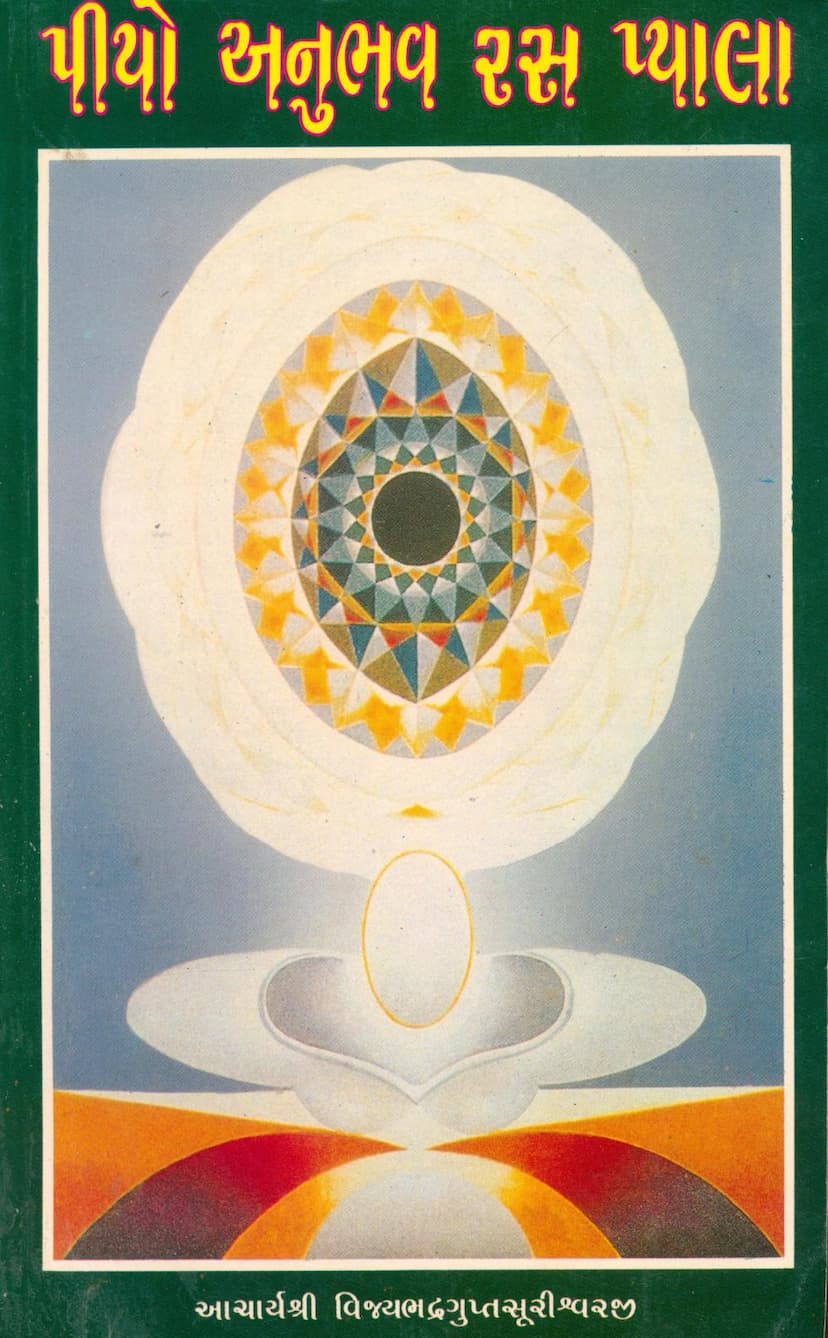Pio Anubhav Ras Pyala
Added to library: September 2, 2025

Summary
This document is a detailed exposition of "Shaamyashatak" (Centillion of Equanimity/Tranquility), a Jain text composed by Acharya Vijay Sinh Surishwarji, with commentary by Acharya Vijay Bhadraguptasurishwarji. The publisher is Shri Vishwakalyan Prakashan Trust. The catalog link provided is jainqq.org/explore/005960/1.
The book begins with an introduction highlighting the significance of human life for spiritual attainment according to all religious founders, particularly emphasizing Lord Mahavir Swami's teachings on the preciousness and purposeful utilization of human life. It states that "Shaamyashatak," though small in size, is profound in its philosophical content. Each verse is designed to inspire virtuous tendencies and contemplation of truth, fostering detachment, universal love, wisdom, rejection of passions, and equanimity. The text aims to strengthen faith and elevate the reader's mental state to a higher spiritual plane.
The introduction further details the structure of "Shaamyashatak," mentioning its initial verses dedicated to devotional meditation on the Pratham Parameshthi (the first supreme being) and the victorious yogis. It then proceeds to describe the joy of equanimity, the dissolution of worldly attachments, the attainment of self-knowledge, and the cultivation of virtues like indifference, non-attachment, and detachment. The text discusses the renunciation of desires, acceptance of forgiveness, victory over ego, destruction of pride, and the dissolution of illusion. It also features verses that highlight paradoxical qualities like greed and contentment, and provides methods to overcome passions and sensory control. The book concludes with an exploration of desire, sensual passions, and mental strength, ultimately emphasizing the grandeur of "Shaamya Bhava" (equanimity).
The text also includes a personal letter from an "Atmasadhak" (soul-seeker) to a "Muniraj" (monk) who is suffering from severe depression. The letter acknowledges the widespread nature of depression and offers spiritual guidance rooted in Jain philosophy. It identifies common causes of depression, even among monks, such as monotony, lack of enthusiasm, negative thoughts, and feelings of failure. The letter strongly links depression to the lack of firm renunciation and the inability to overcome sensory temptations, passions, pride, and hardships, which are identified as weaknesses in many modern ascetics.
The core recommendation for overcoming depression, as presented in the letter, is through the study and contemplation of various spiritual texts, including:
- Shaansaar (Essence of Peace)
- Yogsar (Essence of Yoga)
- Adhyatmasaar (Essence of Spirituality)
- Shaamyashatak (Centillion of Equanimity)
- Vairagyashatak (Centillion of Detachment)
- Dhyanshatak (Centillion of Meditation)
Additionally, several ancient Gujarati texts are suggested:
- Samadhishtak (Centillion of Samadhi)
- Samatashatak (Centillion of Equanimity)
- Pudgal Geeta (Song of Matter)
- Kshama Chhatrishi (Sixty-four Verses on Forgiveness)
- Parmatma Chhatrishi (Sixty-four Verses on the Supreme Soul)
- Yatidharma Battreeshi (Thirty-two Verses on the Conduct of Ascetics)
The letter emphasizes that these texts, when memorized and studied, can rekindle renunciation, provide direction in spiritual practice, and prevent mental lethargy. It likens these scriptures to nourishing rain for the soul and a guiding light in darkness, promising to fill the reader with enthusiasm, reduce sensory agitation, pacify passions, decrease attachment to pride, and increase the capacity to endure hardships. The letter concludes with encouragement to engage with the spiritual community and to find purpose in selfless service.
The book then proceeds with the commentary on each verse of "Shaamyashatak," explaining the philosophical and spiritual significance of each shloka. The commentary delves into concepts like:
- Equanimity (Samata/Shaamya): The state of being free from ego, pride, deceit, attachment, aversion, and the inherent, natural balance of the soul. The commentary emphasizes the importance of recognizing equanimity in the Vitrag (those free from passions) and aspiring to attain it.
- Unmani Bhava: The state of transcending the mind, achieved through equanimity and detachment, leading to spiritual liberation.
- Detachment (Udaasinta/Nirmanamta): The quality of not being attached to worldly pleasures or possessions, which acts as a seed for equanimity and ultimately liberation.
- The Dangers of Passions (Krodh, Maan, Maya, Lobh): The verses and commentary highlight how these passions corrupt the mind, lead to suffering, and hinder spiritual progress. They are depicted as powerful adversaries that must be overcome.
- The Role of Forgiveness (Kshama): Forgiveness is presented as a powerful antidote to anger, a virtue that brings peace and spiritual strength.
- The Illusion of Worldly Pleasures: The text consistently points out that worldly pleasures are temporary, deceptive, and ultimately lead to suffering, often compared to mirages or artificial fragrances.
- The Power of the Mind: The mind is described as a potent force that, when uncontrolled, leads to depression and suffering, but when disciplined through spiritual practice and detachment, can lead to profound peace and liberation.
- The Importance of Renunciation (Vairagya): Renunciation is portrayed as crucial for overcoming worldly attachments and achieving spiritual goals.
- The Nature of Reality: The text distinguishes between the transient, illusory nature of the external world and the eternal, blissful nature of the soul.
The commentary also includes excerpts from the works of Upadhyay Shri Yashovijayji, a renowned Jain scholar, who translated and commented on a similar text called "Samatashatak" in Doha form. This reinforces the profound spiritual value and practical applicability of the teachings.
The book concludes with an appendix listing other Gujarati books published by Shri Vishwakalyan Prakashan Trust.